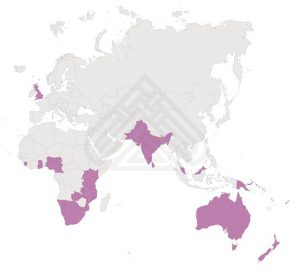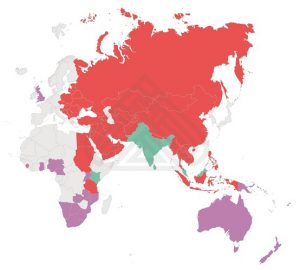Brexit Britain, the Commonwealth, China’s OBOR and the Eurasian Economic Union
With the UK now set to exit the European Union, it appears all bets are off as to how the future trade development of the UK pans out. Freed of the political implications with what appears an EU uncertain on how to proceed without the UK, the reality is that Britain is now free to negotiate its own way forward without having to concede approval from Brussels or to follow its increasingly federal style demands.
Historically, the UK has long built its wealth on trade, and still retains a shadow of its own empire in the form of what used to be titled “The British Commonwealth” and is now more democratically known just as the Commonwealth. This organization consists of 52 member states, the majority of which were former territories of the British Empire. Hong Kong would be eligible to join, but Beijing is not keen to have a reminder of colonial rule over any part of its territory. Other Asian nations, however, are members, including Australia, Bangladesh, Brunei, India, Malaysia, New Zealand, Pakistan, Papua New Guinea, Singapore and Sri Lanka. Several east African nations with strong historic trade ties to Asia are also included, namely Kenya, Tanzania and South Africa.
London has not been especially active in recent years when promoting the Commonwealth as a political or economic unit, preferring to use it as a ‘soft’ organization that quietly serves as a useful platform for discussions among member states over a wide range of issues.
Nonetheless, its sheer size is impressive. The Commonwealth covers more than 29,958,050 km2 (20% of the world’s land area), and spans all six inhabited continents. It has a population of about 2.5 billion people, nearly a third of the world total, and produces a nominal gross domestic product (GDP) of US$10.45 trillion, representing 17% of the gross world product when measured in purchasing power parity. The Head of the Commonwealth is the Queen, and despite British politicians’ apparent neglect of the institution, it is recognized that the Commonwealth retains a special area of affection from the British crown.

The Commonwealth, Eurasia, Oceania and Africa
It remains to be seen whether the UK’s new independence from the EU will result in any debate from London about the possibility of re-engaging with the Commonwealth from a trade perspective. Doing so would mean the creation of institutional entities, such as a Commonwealth Bank, other Funds, in addition to the creation of a mechanism to unify certain taxes as impact upon multi-lateral trade, such as revamping many of the currently outdated Double Tax Agreements and potentially elements of Free Trade. If London does develop the appetite, and other Commonwealth nations agree, there is the potential to dust off the Commonwealth and re-energize European trade with Africa and Asia, and vice versa. The institutional creation of a Commonwealth Development Bank, under Londons jurisprudence, would be a great asset at redistributing wealth and investing in infrastructure. The UK is, in fact, the only European nation capable of pulling off such a feat. It should be noted that on all British coins, the Monarchs head also faces East.
Related Reading: China – UK Trade: The Effects of Brexit
The implications of doing so are vast. At a stroke, the intentions of re-positioning the Commonwealth as a regional free trade bloc would act as a counterbalance too, and collaborate with, China’s OBOR initiatives. The two regions certainly overlap, and in many cases appear complimentary. The UK has decades of diplomatic and trade experience in Africa and Asia, which could help develop Chinese interests.
China’s involvement in Africa for example extends via infrastructure developments to mining and other energy resources, both areas in which the UK has extensive experience and technological know-how. The same is true of Asia. Bangladesh, India, Malaysia, Pakistan, Singapore and Sri Lanka are all Commonwealth members. India and Pakistan are members of the Shanghai Co-Operation Organisation, a Beijing backed body that also includes Russia, and promotes development across Central Asia. Brunei, Malaysia and Singapore are all members of ASEAN. Should the Commonwealth be adjusted to include “observer” or “honorary” status for territories such as Hong Kong and Myanmar, then the Chinese could be persuaded to get more involved, albeit in a manner inoffensive to their own political concerns.
China has already laid out its own intentions concerning the development of trade in a world being shaped by an apparently more isolationist United States. With the demise of the TPP, and negotiations concerning the replacement RCEP and FTAAP deals likely to take years, China has been upping the ante on Free Trade throughout Eurasia. For this though, participation needs to look towards Russia, and the Moscow backed Eurasian Economic Union (EAEU).
This body, which currently comprises Russia along with Armenia, Belarus, Kazakhstan, and Kyrgyzstan, may appear somewhat esoteric, even for British energy plays. But that’s only part of the story. The EAEU has an integrated single market of 183 million people with a gross domestic product of over US$4 trillion in terms of purchasing power parity. The area enjoys free movement of goods, capital, services, and people, and provides for common policies in the macroeconomic sphere, transport, industry and agriculture, energy, foreign trade and investment, customs, technical regulation, competition, and antitrust regulation.
China’s application to have an FTA with the EAEU will, if approved, secure it long coveted access to Russian energy, and the ability to jointly develop mining and energy exploration throughout the region with respective governments, such as Kazakhstan, another energy rich country.
This prospect is so attractive that other Asian nations are also getting on board the EAEU train: India, Iran, Singapore, and Turkey among them. Meanwhile, several countries have already signed an FTA with the EAEU, namely Moldova, Uzbekistan, and Vietnam. There are indications that other nations are also considering the idea.
Of all the multilateral FTAs China is looking at, the EAEU promises the best deal in terms of offering China regional influence, commodities, and opportunities to sell services and infrastructure development along the OBOR routes. Should the EAEU’s negotiations with China, India and Singapore prove successful, that elevates it from a relatively small, five nation Central Asian trade bloc into a complete Eurasian entity linked by Free Trade to China, India and ASEAN, and the entire OBOR region, including parts of Europe.
Related Reading: China & Russia Propose Vast Eurasian Free Trade Zone & SCO Development Bank
The EAEU potential makes up a large component part of China’s OBOR intentions. Britain, meanwhile, is somewhat on the periphery of this. However, with the possibility of a detente towards Russia on the horizon, and a long prior history of British-Russian trade (a subsidiary of my families old company drilled the first 13 stations on the Moscow Underground) it would not be out of the question for the UK to indulge in a bit of sanctions busting and resume trade relations with Moscow.
If so, interest in the EAEU could easily start to heat up – an EAEU-UK Free Trade Agreement would potentially place Britain in the front line of getting involved with infrastructure development projects, along with the Chinese, across the entire Eurasian landmass. It would also place UK business well ahead of French and German capabilities of both selling to Russia and engaging with China on OBOR projects. Should India agree an FTA with the EAEU then this potentially, negates the need for a separate UK trade agreement with Delhi. The same potentially applies to Singapore and access to the South-East Asia markets of ASEAN.

The Commonwealth, EAEU & OBOR Combined. Countries combining both are shown in blue.
It remains to be seen whether or not London wishes to re-set the United Kingdom on a course that will better integrate it with Eurasia rather than the EU. However, the UK already has an existing population of eastern European, Chinese, Central Asian, African, southeast Asian, Indian and Russian derived, British nationals and visitors who have made the UK their home. Given the population mix of the UK, an active engagement with the Silk Road, China’s OBOR initiatives and the Eurasian Economic Union, using the existing Commonwealth base as a supporting structure is both entirely feasible and one that makes a lot of sense. In this post-Brexit world, the UK needs to find new paths to tread. Engaging with China’s OBOR via the Commonwealth and EAEU may be one strategy worth examining.
Related Reading:
Silk Road and OBOR Business Intelligence
Dezan Shira & Associates´ Silk Road and OBOR investment brochure offers an introduction to the region and an overview of the services provided by the firm. It is Dezan Shira´s mission to guide investors through the Silk Road´s complex regulatory environment and assist with all aspects of establishing, maintaining and growing business operations in the region.
Dezan Shira & Associates and the United Kingdom Relationship Brochure
China’s New Economic Silk Road
This unique and currently only available study into the proposed Silk Road Economic Belt examines the institutional, financial and infrastructure projects that are currently underway and in the planning stage across the entire region. Covering over 60 countries, this book explores the regional reforms, potential problems, opportunities and longer term impact that the Silk Road will have upon Asia, Africa, the Middle East, Europe and the United States.









